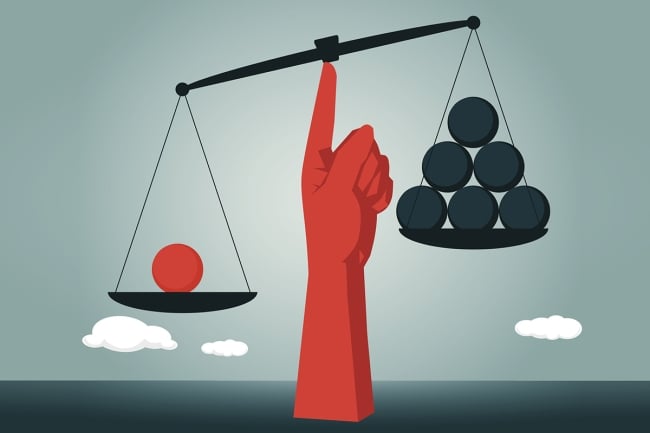You have /5 articles left.
Sign up for a free account or log in.

erhui1979/Digitalvision Vectors/Getty Images
If you ask a Ph.D. student “Are faculty fair?” their answer will probably depend on how things are going at that moment with their supervisor or thesis committee members. The answer may also reflect their lived experiences and priorities, including those that are social, financial, academic and personal. Fairness is something we know exists in a particular relationship or context—or conversely, does not—but we may not be able to explain why. Fairness is a ubiquitous and amorphous concept.
In our work as ombuds and conflict managers across several colleges and universities, we’ve heard some variation of “It’s not fair” in just about every conversation we’ve had about supervision. Everything from, “It’s not fair that my supervisor won’t let me be first author on the paper that we’re writing. I’m doing almost all the work!” to “My supervisor is rarely on the campus, but all of the Ph.D. and postdoc researchers are expected to be there early and work late. It’s not fair for them to expect so much and be around so little” to “Why doesn’t my supervisor treat me fairly?”
So why should fairness matter to faculty members? And what happens when grad students feel faculty members aren’t fair?
Fairness impacts how grad students feel about the outcomes of a committee meeting, thesis discussion or departmental process, as well as their sense of belonging in a department or university. When students perceive that a process is fair, they are more likely to engage respectfully with faculty members in that process and accept its outcomes. Fairness can also enhance the connection between the researchers and their research. Fair processes facilitate communication and engagement, acting as a precondition to build trust, respect and a sense of belonging—all markers of successful supervision.
A department where graduate students are confident that decision-making processes are fair, transparent and merit-based will benefit from social trust, and conflicts will be more likely to be resolved quickly and informally. For instance, a Ph.D. student who is disappointed by a departmental scholarship application is less likely to complain about the decision if they believe the award allocation process is fair.
Conversely, a sense of unfairness can result in students disconnecting from their adviser, from their research, and from their program—not contributing meaningfully to the research, not meeting progress targets, changing supervisors or programs, or leaving grad school altogether. (See here for data on doctoral completion rates in Canada; data from the United States can be found here; in both countries doctoral completion rates are less than 58 percent.) Indirectly, unfairness can have an impact on academic research results, which means significantly fewer articles and less funding—creating a nightmarish cycle for faculty supervisors.
The challenge is that unfairness can hide in plain sight. A department where graduate students believe that administrative decisions are arbitrary, politicized or overly hierarchical will more often struggle with competitive and potentially toxic workplace relationships. Conflicts may escalate quickly, and formal processes may be engaged as a path to achieving a “just” or “fair” outcome. For example, complaints related to authorship are more common in laboratories and departments where the process of determining the order of authorship on co-publications is unclear.
We’ve heard in many conversations with graduate students that their supervisors failed to listen to them, rarely explained themselves (or failed to do so with any degree of clarity), and seemed painfully unaware of their own biases or the impact that their actions—or inactions—have on grad students. So, even if as a professor you thought were being fair, chances are you might not have been perceived to be fair.
As conflict coaches, we’ve witnessed the fall-out of unfairness on research progress and supervisor-student relationships. Grad students have told us that they expected that the supervisors they had chosen to oversee their research would fairly address any situations that might arise, with consideration for their stories and experiences. When this expectation was not met, students were often distraught and uncertain about their options and next steps.
Put this way, it seems like fairness should be a key priority for faculty members. If it is, how can they make sure that they not only are fair but are perceived to be?
Fairness is complex, and, ideally, it is woven into processes, systems, relationships and outcomes. We all have a sense of what these words mean and know how an “unfair” situation makes us feel, but we might struggle to define the word. However, in working as ombuds, we use set principles of fairness to assess whether a process, outcome or interaction was fair and reasonable. Why shouldn’t faculty?
A clear place to start is with procedural fairness—which focuses on fairness of the processes used to make decisions and take action. The basic elements of procedural fairness have been defined and refined over decades by the courts: participatory processes, open-minded decision-makers and reasoned decisions. In the higher education context in Canada, we often refer to the “fairness triangle,” originally conceptualized by the Saskatchewan Ombudsman, which has procedural fairness, substantive fairness and relational fairness as its three sides, and which has been interpreted as including equitable fairness.
We recommend five things that faculty members can do today to enhance procedural fairness in their interactions with graduate students:
- Make sure discussions and information-sharing are not one-sided. Informal and formal processes should allow for real participation by students before decisions are made.
- Help everyone to be on the same page about what the objectives of the discussion are, what the expected outcomes will be, when they will occur, and what information is needed from participants. For example, in the email in advance of a supervisory meeting, provide details: “We are going to talk about your progress. Please put together a timeline that we can discuss to ensure you will be on track to meet each milestone outlined in the [link to policy/guideline]. It’s important to me to regularly confirm your progress and ensure that you have enough support to stay on schedule.”
- Be open-minded. As a decision-maker/action-taker you want to come to conclusions without bias or prejudgment. For example, even if things sound similar to other conversations or situations, ask questions to create opportunities for open dialogue: “Where do you think we should start our discussion?” or “What is a priority for you in terms of next steps?”
- Provide clear and understandable reasons for any decisions or actions. Consider for example, responding to a student’s request for an extension as follows: “I understand your request for an extension, however, I will not be approving the request. Please continue to follow the revised timeline you provided [on date]. As confirmed in our earlier email exchange, if you do not move to the next stage in your research you risk being offside of the university’s policy on academic progress [link] …”
- Pay attention to relevant information, take specific circumstances into consideration, and have an understanding of the context—including policies, guidelines and prior decisions. As in the earlier example, the policy on academic progress is relevant to the decision being made, as is the fact that the student had already revised their timeline—this is a second request. In this example, the student did not provide specific and compelling reasons why the extension should be granted.
In other words, faculty members can strive to be transparent, open and self-aware, as well as practice active listening. A fair process will set out clear expectations for participation and respectful engagement, and result in outcomes that are defensible and durable. Indeed, the best defense can be a fair offense. To use a phrase popularized by Getting to Yes, fairness can create a win-win situation. So the next time you are preparing for a progress discussion or a thesis committee meeting with your Ph.D. student, consider these five procedural fairness tips. Fairness matters.








